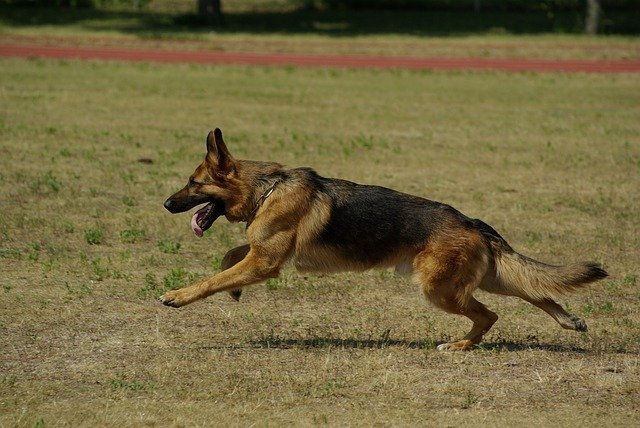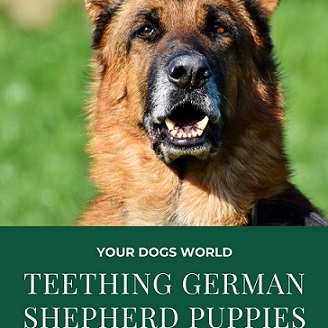Teething is natural for animals when they get their first set of teeth. Many prospective German Shepherd owners commonly ask what to expect from a teething German Shepherd puppy.
Teething in German Shepherd tends to start after approx 8 months when you can see some symptoms like odd behavior, excessive drooling, etc.
Below we have compiled some answers and information to prepare you for this event.
Stages of German Shepherd Puppy Teething
From birth to adulthood, a German Shepherd puppy will undergo several stages of dental development. It finally ends when he grows his permanent set of adult teeth. Here are the notable stages where landmark dental growth is observed:
Stage 1 – Newborn German Shepherd
Like most dogs, German Shepherd puppies are born without any teeth at all. It will be another 14 days (approximately) before milk teeth surface. Milk teeth are the first teeth that surface, they are temporary teeth.
German Shepherd puppies will usually start opening their eyes around the same time teeth emerge. This means that growth changes drastically after the 2-week mark.
Their teeth emerge in a specific order as follows:
- Incisors (situated in the front, for biting)
- Canines
- Premolars (situated at the back, for chewing)
After all the teeth stop developing in approx 8 weeks, your puppy should have 28 milk teeth. This is his first set of teeth, but they will not be staying for long!
Stage 2 – Start of German Shepherd Puppy Teething
After your puppy turns 3 months old expect teething to start!
Teething usually lasts for 4 to 5 months.
This will be a tough time as apart from teething, the milk teeth will also fall out. During this time, all 28 milk teeth will be replaced by adult teeth. Adult teeth are a permanent set of 42 teeth that will stick with the puppy during his life.
Stage 3 – Teething ends
Usually, at the 7 to 8 months mark, teething will likely come to an end. This is not a fixed figure and your GS puppy might have teething issues for a longer or shorter period of time.
Popular Post – Tips for breeding German Shepherd
Symptoms and Signs of Teething German Shepherd Puppies
Teething is a milestone event in a puppy’s life.
But it will not be smooth sailing since teething is usually accompanied by some signs and symptoms. If your puppy is showing a few of these symptoms, he is teething.
Odd Behavior
If your German Shepherd puppy starts acting weird when he is only a few months old, teething is to blame! A combination of sensations caused by teething can make your puppy act differently!
Do not worry, once the teething passes he will be back to his old nature.
Excess Drooling
A high amount of drooling is caused by excessive chewing. Chewing does help alleviate the teething tendency a lot. But unfortunately for you, lots of drool is common for teething puppies.
The best thing you can do is clean up after them and offer to wipe their mouths. This makes sure your puppy stays hygienic and avoids the initiation of any infection.
Blood Spots on Toys
Teething can get messy especially since small blood spots on toys are a possible symptom. If you see this on the toys, do not panic, it is normal. Instead, try to give the toys a wash to maintain hygiene and safety.
Increased Chewing
When teething, the best way to numb the tingling sensation is to apply pressure. This is why a teething puppy will take to chewing to subside the tingling. If you notice your puppy wanting to chew on everything, it is a sure sign of teething.
Painful Gums
During the teething process, the gums of your German Shepherd are bound to be red and swollen. Pain and possible bleeding are to be expected as teeth fall out or new ones emerge. Not much can be done to help them during this process.
You could try to offer them a soothing soft edible treat that doesn’t require teeth.
Fever
A mild fever during teething is common and will pass eventually. It probably occurs because the body might be reacting to the chance of a dental infection.
Irregular Teeth Alignment
Have you been up close and personal with your puppy’s teeth?
You may have noticed several misaligned teeth. This just happens when adult teeth push through but the milk tooth has not fallen out.
The milk tooth will eventually fall out and offer the adult tooth more space to grow properly. Thus, the teeth will automatically align property without assistance.
Loose Teeth
If you have had a dog before, you will probably notice when your puppy stops eating or keeps eating on one side of his mouth. A loose tooth or two can be the cause of pain and irritation.
What is Teething?
Teething occurs in all animals that have teeth, even humans. It is the process of teeth emerging from the gums. It is a necessary process that leads to adult teeth, the second set of teeth.
Toys to Help a German Shepherd Who is Teething
Many German Shepherd owners suggest giving your teething puppy a chew toy.
Why a chew toy? Dogs who are teething usually take to chewing anything around the house. Chewing things helps the puppy deal with the teething sensation.
Chew toys made from soft yet strong material are best. You can select a chew toy that allows you to put a tasty treat inside it. This keeps your puppy mentally and physically engrossed in the toy.
You can even put the toy in the freezer. The cooling effect helps relieve the teething sensation. Bits of soft meat frozen in an ice cube can also be a good treat and toy.
NOTE: Avoid giving your GS puppy a rawhide chew toy. Rawhide is said to cause problems in the intestine when ingested, making it expand and wrap around. It may also cause your puppy to choke. It is best to avoid it altogether.

How to Stop a Teething German Shepherd Chewing Furniture?
While teething, a puppy may easily damage household objects, especially furniture!
This becomes a problem if you have expensive items in your house. Taking things away, keeping doors closed, and watching your dog are just not feasible options.
So how can you stop your dog’s instinct to chew anything in sight?
As owners, you have to become creative and put some thought into it. Here are some ideas on how to prevent damage due to chewing:
1) Install gates (barriers)
Areas that have a large number of items that can be chewed should have restricted access. We understand that every room cannot be sealed off.
But it does help to apply a removable gate to some of them. Plus you can get them removed as soon as teething ends and training is complete.
2) Exercise your puppy
Exercising your puppy has several benefits that are not just physical.
When you exercise your puppy, it may make him tired enough to sleep. If he is asleep, he will forget about the pain caused due to teething. Therefore, exercise can help a puppy chew less and damage fewer objects around the house.
3) Keep their mind occupied
Keeping his mind on one thing can take it off another!
An occupied puppy will not be paying attention to his teething. This way you can help offset any destructive behavior as well.
Playing games is usually the best way to keep a puppy mentally stimulated and physically occupied.
4) Offer Chew Toys
One way to stop your puppy from chewing furniture is to selectively choose the object he chews. Invest in a range of Chew toys that are durable and safe for puppies. This allows him to focus his destructive behavior on a single item.
5) Teething Gel
A specially formulated canine-safe teething gel might not completely eliminate the sensation and pain of teething. But it can still make it more bearable. This gives your puppy a chance to play and enjoy being a puppy!
Several puppy teething Gel brands are available. They mostly use natural ingredients such as Chamomile and Peppermint.
6) Use a Crate
It might seem nasty, but keeping your German Shepherd puppy in a crate for a while can save the furniture.
Training Your Puppy to Stop Chewing
For a new German Shepherd puppy owner, this might sound easier said than done! However, there is proof that with the right technique and a bit of patience you can train a puppy to stop chewing.
- The first step is to let your dog know that he is doing something wrong. When he begins to chew something, let him know by saying ‘NO’, firmly. Dogs are intelligent and will sense something is not right.
- Secondly, never reward a bad habit. Exactly when you give a dog a treat, influences his future behavior. If you give a dog a treat to stop him just as he chews something, it will make him do it again.
- Do not use physical methods (yelling and smacking) to show your disapproval for bad behavior. Puppies are somewhat delicate and will take such treatment heavily.
- German Shepherds are known to be very obedient students and are easily trained. Use treats, praise, and other positive methods to make training less boring.
If you are set on getting a German Shepherd Mix, make sure to check out How Big Do German Shepherd Mixes Get.
FAQS
A German Shepherd puppy can undergo teething for 4 to 5 months (20 to 24 weeks). This is not a strict timeline and some puppies may exceed this duration. There is nothing to worry about if your puppy is teething longer than this time.
A variety of symptoms during teething is normal for a puppy. Puppy teething can be characterized by the signs like odd behavior, excessive drooling, sore gums, blood on toys, fever, misaligned teeth, etc.
At birth, a German Shepherd puppy will have absolutely no teeth. After a few weeks, the puppies will develop 28 milk teeth which are temporary. To replace this set of teeth, 42 permanent teeth will emerge. This permanent set of teeth will start arriving gradually from 3 months to 6 months of age.
Looking to adopt a unique German Shepherd? Take a look at the Blue German Shepherd.

